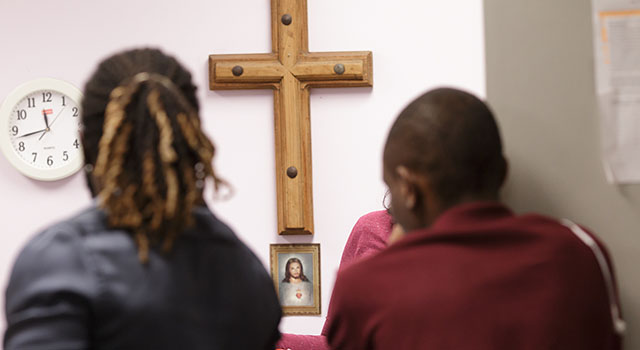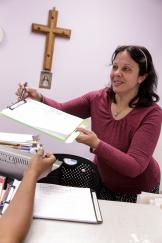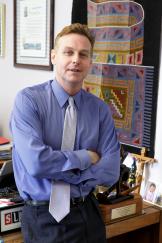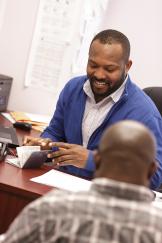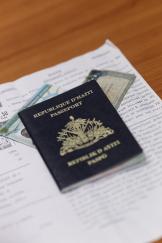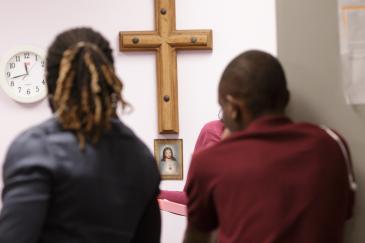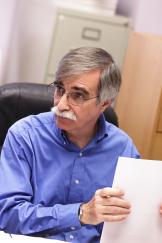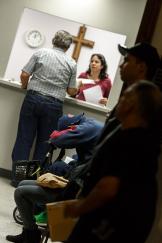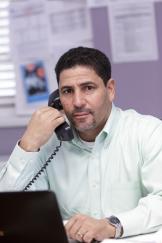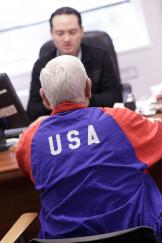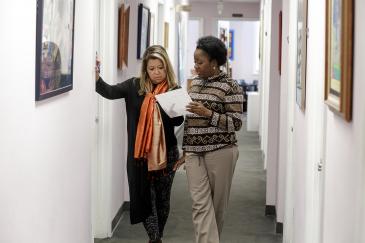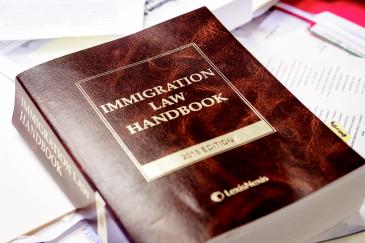By Tom Tracy - Florida Catholic
Photography: TOM TRACY | FC
MIAMI | With a modest team of less than 20 lawyers and other support staff, the Archdiocese of Miami’s Catholic Legal Services and its partner agencies are punching well above their weight.
The last several years have seen a high-profile influx of teen immigration fleeing violence in Central America, a steady uptick in Cuban immigration, and the increasing the U.S.
All of these factors have had repercussions in South Florida, with its geographic and cultural ties to Central and South America, not to mention a sizeable immigrant population that came here from Haiti after the devastating 2010 earthquake.
Randy McGrorty, who oversees Catholic Legal Services in its three locations throughout the archdiocese, said the CLS offices tackle just about any immigration matter that clients in need present, with the one general exception: business-sponsored immigration for employment.
Yet even that exception comes with a caveat: CLS processes immigration paperwork for foreign-born priests and religious men and women who come for both short and long-term assignments within the Miami archdiocese.
Doing it all
“We do everything from a U.S. citizen who wants to petition for a child or a spouse to (reside here) to more complicated asylum and humanitarian relief cases for Haitians still facing difficulties in Haiti,” said McGrorty, who works in the main CLS office downtown, in the Ingraham Building near the old Gusman Center.
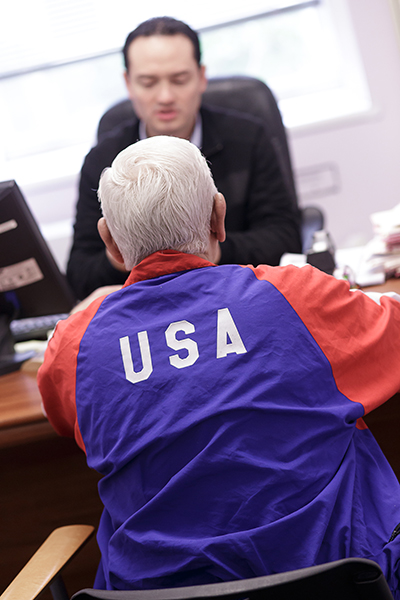
Photographer: TOM TRACY | FC
Dante Ledenchy, a Catholic Legal Services paralegal, meets with a client seeking help with immigration matters.
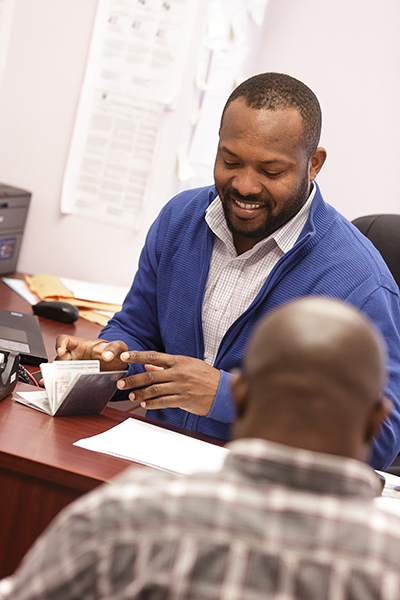
Photographer: TOM TRACY | FC
Cassy Pierre, a paralegal with Catholic Legal Services, meets with a client who is seeking asylum.
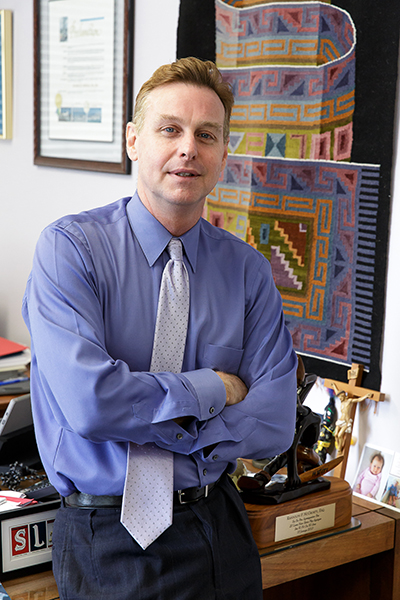
Photographer: TOM TRACY | FC
Randolph McGrorty is the chief executive officer of Catholic Legal Services of the Archdiocese of Miami.
Each day, scores of immigrants pass through the doors there seeking assistance with the often lengthy and detailed paperwork associated with the various stages and varieties of immigration processing and resettlement, including asylum status.
Other CLS offices include a specialized outreach in Doral which focuses on processing Cuban immigrants, while a third location is situated in Broward County at St. Stephen Parish in Miramar.
McGrorty says that some clients qualify for free legal
Somewhat reminiscent of the years when the Church in South Florida helped resettle thousands of Pedro Pan unaccompanied minors fleeing Cuba in the early 1960s, CLS was asked to be one of the lead non-profit agencies offering legal representation to the sudden influx of unaccompanied minors from Central America who crossed the U.S.-Mexico border during the last two years.
Unaccompanied minors
Tens of thousands of youths, largely from El Salvador and Guatemala, needed complex material, social and legal support. Many had relatives living in Palm Beach,
For some with no family, Boys Town in Miami, operated by the archdiocese’s Catholic Charities, has become a temporary home, according to McGrorty.
At the end of last year, Miami Archbishop Thomas Wenski appealed to the U.S. Secretary of Health and Human Services after federal resettlement funding for the Central American youths’ legal needs was temporarily redirected to an agency with little to no experience in legal matters. In February, that federal funding for CLS and one other local agency was restored.
“All of them must face an immigration judge, and they have a right to a lawyer � but not at a government’s expense,” McGrorty said. “So we saw these young children of a tender age sitting in front of a judge trying to explain to the judge why they needed to be here.”
“A
“When a child is represented they are five times more likely to win their case,” he noted.
'Not ordinary gangs'
Ultimately, the unaccompanied immigrants have to prove one of two legal criteria in order to stay: They must articulate a fear that they will be harmed if they return to Central America as a result of political activities or a social activity.
“Many are pleading (that they fled) gang violence, and that is not a good plea,” McGrorty said, noting that U.S. judges have been slow to fully grasp the severity and thoroughgoing nature of gang life in Central America.
“We are trying to educate the justices that these are not ordinary gangs, these are highly organized institutions serving as de facto governments where there is no justice, security or job opportunities,” he said.
In Florida in recent years, there also has been much talk and worry in immigrant communities about the real or perceived increase of federal deportations of immigrants, ostensibly focusing on persons with criminal records.
McGrorty said the Obama administration has stepped up deportation proceedings especially of Haitians, Central and South Americans here, but he argued that it is not clear that many of the deportees actually had relevant criminal histories. The uptick in deportations is therefore perplexing, he said.
Apply for citizenship
McGrorty argues that ultimately it is in the best interests of immigrants and of the U.S. as a whole to bring immigrants out of the shadows and to encourage them to apply for U.S. citizenship. It is a process that costs several hundred dollars, requires some basic grasp of the English language and a lengthy application.
To that ends, CLS recently announced the launch of Citizenship 1-2-3, a program of the New Americans Campaign, as an effort to help people through the process. (See accompanying story)
“We are urging people to reach out on their own to naturalize and not be intimidated by the process,” said McGrorty.
“As we speak there are 400,000 people in Miami who are eligible (to naturalize) after five years, who met their requirements but haven’t applied for citizenship,” McGrorty said.
He credited both Archbishop Wenski locally and Pope Francis globally for their leadership in urging increased sensitivity and a compassionate reception of migrant peoples.
The U.S. Presidential election year has stressed those efforts with hot rhetoric related to immigration but McGrorty sees a silver lining to some of the rough public discourse.
“Let’s hope that the xenophobia gets out of everyone’s
